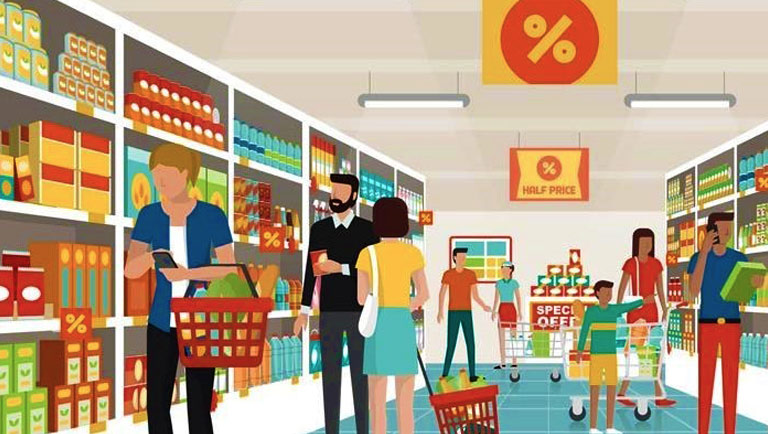
What Is Retail?
Retail is the last channel of distribution in which small quantities of products (or services) are directly sold to the customer for use by the consumer.
Two important phrases in this definition that separate wholesale and retail are
- Small quantities of products: Unlike manufacturing or wholesale the number of items that are involved in retail transactions is significantly smaller.
- Directly at the user: Retail stores are the last distribution channels in which real sales to the customer occur.
What Is Retailing?
Retailing is the process of a retailer acquiring the items (either from wholesalers, manufacturers or agents) and then selling them to customers to be used.
Simply put, selling is the exchange of small amounts of goods between a retailer as well as the customer, in which the product is not purchased for the intention of reselling.
Mobilink Bank the ‘Best Retail Bank in Pakistan’
Mobilink Bank puts Forth Policy Recommendations
REDRETAIL to Offer Mobile Top Up Solutions
JazzCash Brings You Mastercard
Wateen Telecom partners with Punjab Group of Colleges
Zong Wins the 4G Spectrum Auction in AJK & GB
What is A Retailer?
A retailer is an individual or business selling small amounts of products to customers to use for their own purposes.
Remember
- The retail channel is one of the distribution
- Retailing is a business process
- Retail can refer to a business or individual
Importance of Retailing
The mission for the Retail Business Solutions department is to assist member retailers to improve their bottom line profit by assisting them in selecting, implementing and implementing systems for retail that are automated.
Retailing is essential for consumers, the creators as well as the economy.
Retail stores are the locations where the majority of sales to customers are taking place. The stores act simultaneously as a sales tool for brands as well as an aid for customers to share and exchange important information.
In addition, shopping, retailing is excellent economic asset. It creates jobs, contributes to GDP, and is an important shopping channel in the festive season.
How Retail Works?
Retail operates on a basic revenue model that is based on the mark-up. Retailers buy the items at a cost, add up the cost of labor, equipment and distribution along with the profit margin that they desire and then sell it at a higher cost.
Fall in Love with the Blazing Fast Performance of realme C21Y
Get realme C21Y on Daraz for PKR 20999
realme C21Y Now Available in Pakistan
Promising Real Performance realme C21Y
realme C21 Now at an Affordable Price of PKR 17,999/-
realme C25s Receives Rave Reviews
Retailing Types
The retail industry can be classified into five different types. Below are the different kinds of retailing available currently and are currently in use.
- This includes different types of retail stores such as department stores specialty stores, supermarkets catalogs, convenience stores, showrooms drug Superstores, stores and discount stores, as well as extreme value stores, etc.
- Non-store retailing is an aspect of retailing in which the transaction is conducted outside traditional stores or shops. It can be further classified into two kinds namely directly retailing (where the company employs direct methods, such as door-to-door selling) and automated vending (installing automated vending machines that offer a wide range of products without the need for an individual retailer).
- It is the practice of selling through channels owned by corporate companies such as franchises, chain stores, and conglomerates of merchandising. Corporate retailing is focused on selling items that belong to only the parent brand or the partner brand.
- Internet shopping or online retailing operates in a similar way to selling small amounts of merchandise to the end consumer but they’re a way to reach a wider market, and does not have an actual retail store in which the consumer can go and try or touch the item.
- It is not the case that retailers only offer tangible products; their products also comprise services. If a retail store is dealing with services, this process is known as service retailing. Restaurants, hotels, bars, etc. are examples of retailing of services.
Characteristics of Retailing
Retailing is distinct from manufacturing or wholesaling because of its distinctive features, which include:
Direct contact with customers: is required for retailing. The close interaction with customers. It serves as a mediator between wholesalers and their customers, or the manufacturer and consumer depending on the channel of distribution that is used.
Relationship with customers
- Retailers create a connection with their customers and assist to decide on what products and services they can pick for themselves.
- Retailers typically stock smaller quantities of merchandise when compared to wholesalers and manufacturers.
- Retailers typically stock different products of various brands in line with the market demand.
- Retailers act as representatives of the business to customers at the end who provide their feedback and suggestions.
- Retail stores generally have very small shelves and will only carry items that are in high demand.
- Since retailing is the process of offering products directly to customers, it also sells the products directly to the purchasers and also observing the most expensive price for the item.
Enjoy Uninterrupted Connectivity with Ufone
Ufone Pledges Support To Foster Awareness On Breast Cancer
Ufone & Microensure Introduce Family Health Insurance
Ufone collaborates with PBA for ‘Mera Pakistan Mera Ghar’
PTCL Group Cements its Market Standing
Functions of Retailing
Retailers perform a myriad of functions they must fulfill in order to aid in the sale of products. This includes:
Sorting
Manufacturers make large amounts of similar products and prefer to offer their stock to a select group of purchasers who buy in large quantities. The customers want many kinds of products from various manufacturers, they also want a wide selection of products to choose from. Retailers can meet the demands of both parties by collecting and sorting items from different sources and arranging them in line with customers’ requirements.
Breaking Bulk
Retailers buy the products from wholesalers and producers in large quantities, but then sell the goods to customers in smaller quantities.
Channel of Communication
Since retail has direct contact with the consumer and consumers, it is an important communication channel for manufacturers and companies. Manufacturers try to convey the benefits of their products along with discounts and offers through retailers. Retail is also an intermediary between the business and the customer and relays the feedback of customers to the wholesaler or manufacturer.
Marketing
Stores in retail are often the primary channels through which the final decision-making takes place. Therefore, they act as an important channel for marketing for brands. The right placement of banners, banners ads, promotions and various other strategies are employed by manufacturers to boost sales at retail shops.

